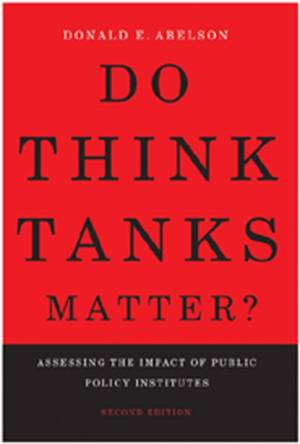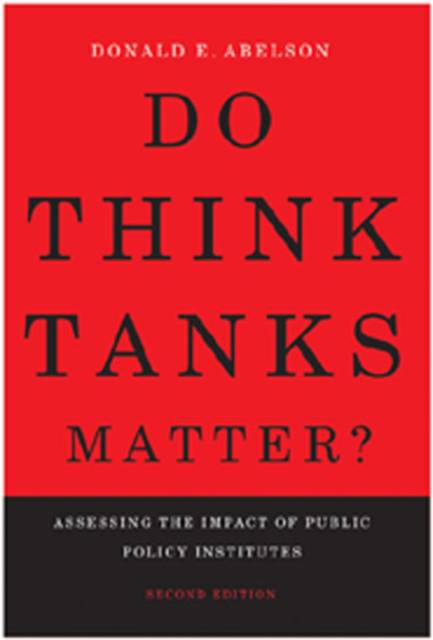
Je cadeautjes zeker op tijd in huis hebben voor de feestdagen? Kom langs in onze winkels en vind het perfecte geschenk!
- Afhalen na 1 uur in een winkel met voorraad
- Gratis thuislevering in België vanaf € 30
- Ruim aanbod met 7 miljoen producten
Je cadeautjes zeker op tijd in huis hebben voor de feestdagen? Kom langs in onze winkels en vind het perfecte geschenk!
- Afhalen na 1 uur in een winkel met voorraad
- Gratis thuislevering in België vanaf € 30
- Ruim aanbod met 7 miljoen producten
Zoeken
Do Think Tanks Matter?
Assessing the Impact of Public Policy Institutes, Second Edition
Donald E Abelson
Hardcover | Engels
€ 156,95
+ 313 punten
Uitvoering
Omschrijving
It is often assumed that think tanks carry enormous weight with lawmakers. In Do Think Tanks Matter? Donald Abelson argues that the basic question of how think tanks have evolved and under what conditions they can and do have an effect is consistently ignored. Think tank directors often credit their institutes with influencing major policy debates and government legislation and many journalists and scholars believe the explosion of think tanks in the latter part of the twentieth century indicates their growing importance in the policy-making process. Abelson goes beyond assumptions, identifying the influence and relevance of public policy institutes in today's political arena in the United States, where they've become an integral feature of the political landscape, and in Canada, where, despite recent growth in numbers, they enjoy less prominence than their US counterparts. By focusing on the policy cycle, issue articulation, policy formation, and implementation, Abelson argues that individual think tanks have sometimes played an important role in shaping the political dialogue and the policy preferences and choices of decision-makers but often in different ways and at different stages of the policy cycle. This revised and updated edition of the book includes up-to-date data (2000-08) on the growing visibility and policy relevance of think tanks in Canada and the United States.
Specificaties
Betrokkenen
- Auteur(s):
- Uitgeverij:
Inhoud
- Aantal bladzijden:
- 360
- Taal:
- Engels
Eigenschappen
- Productcode (EAN):
- 9780773536074
- Verschijningsdatum:
- 1/09/2009
- Uitvoering:
- Hardcover
- Formaat:
- Genaaid
- Afmetingen:
- 152 mm x 229 mm
- Gewicht:
- 639 g

Alleen bij Standaard Boekhandel
+ 313 punten op je klantenkaart van Standaard Boekhandel
Beoordelingen
We publiceren alleen reviews die voldoen aan de voorwaarden voor reviews. Bekijk onze voorwaarden voor reviews.









